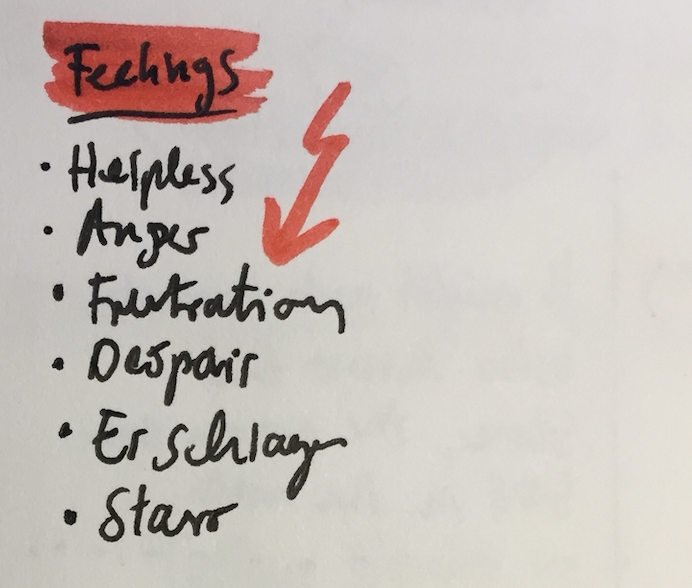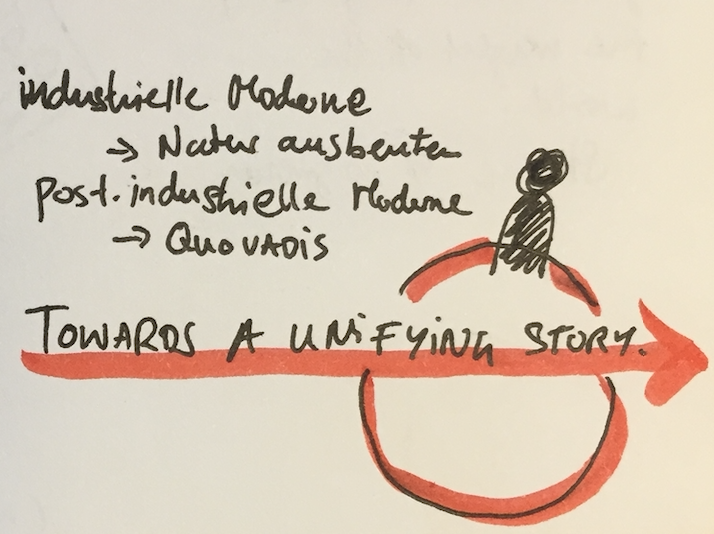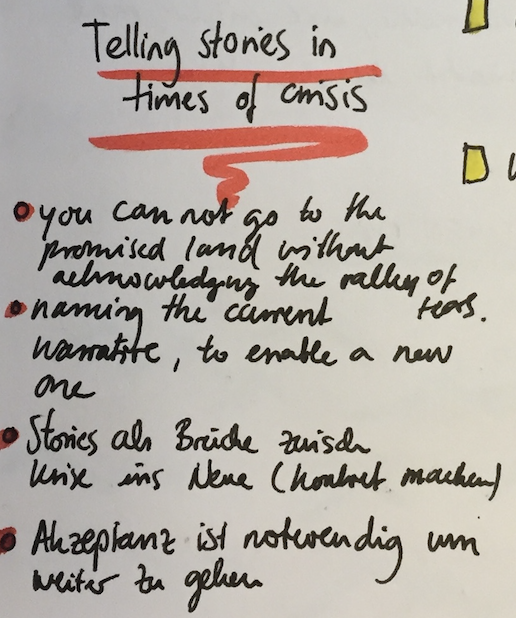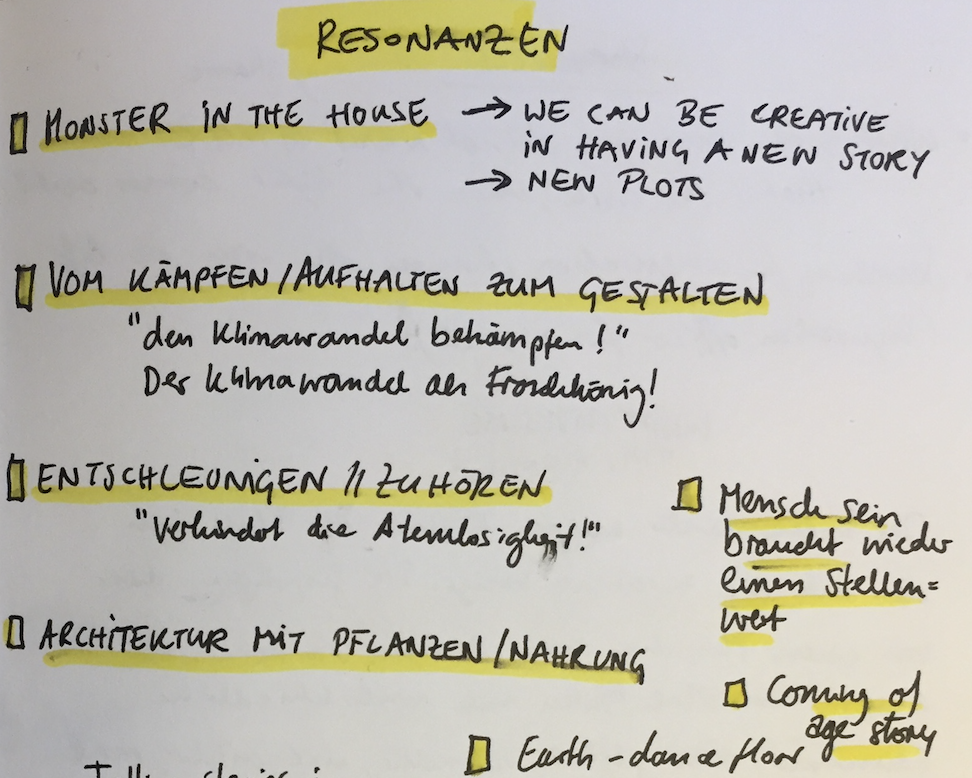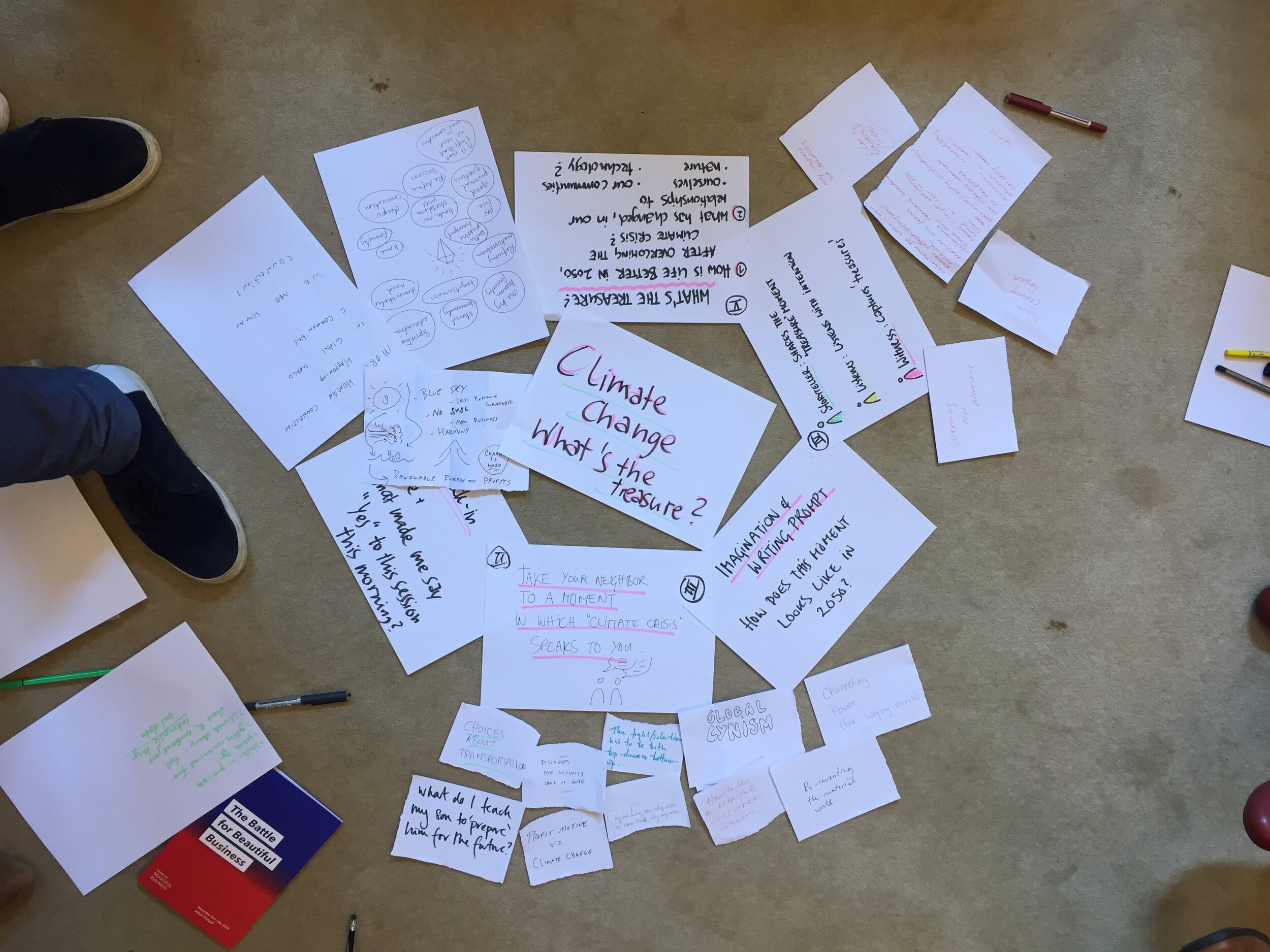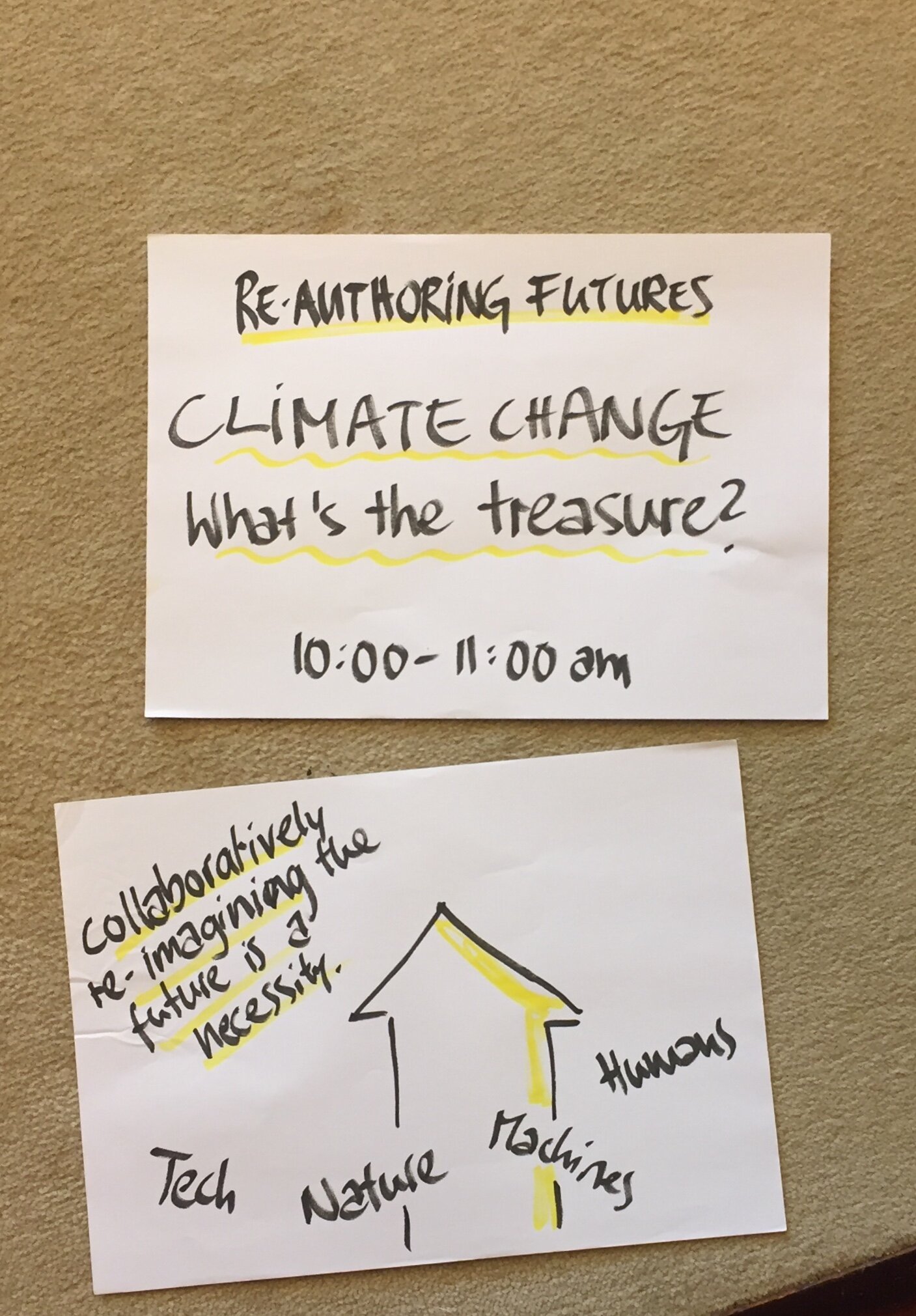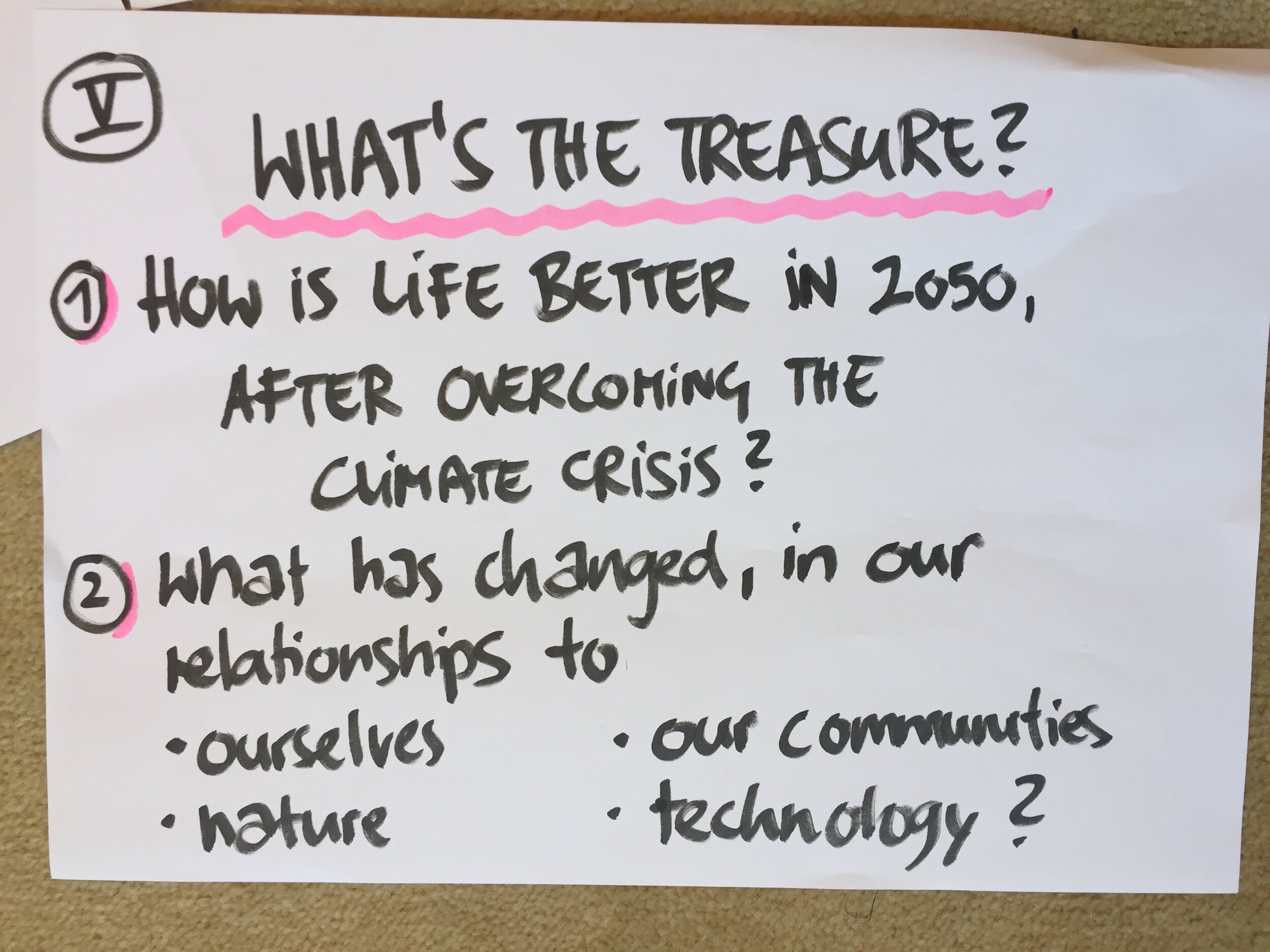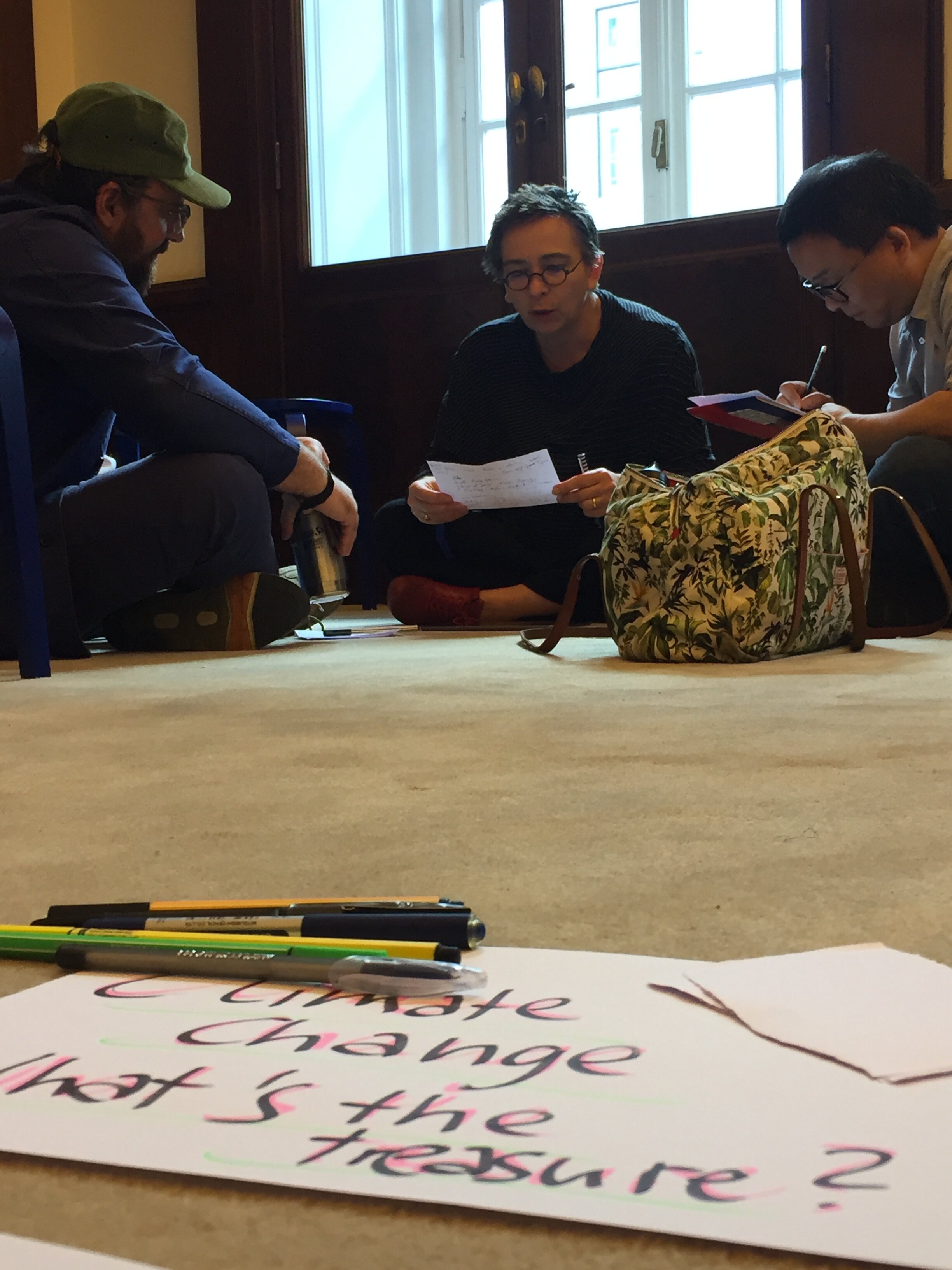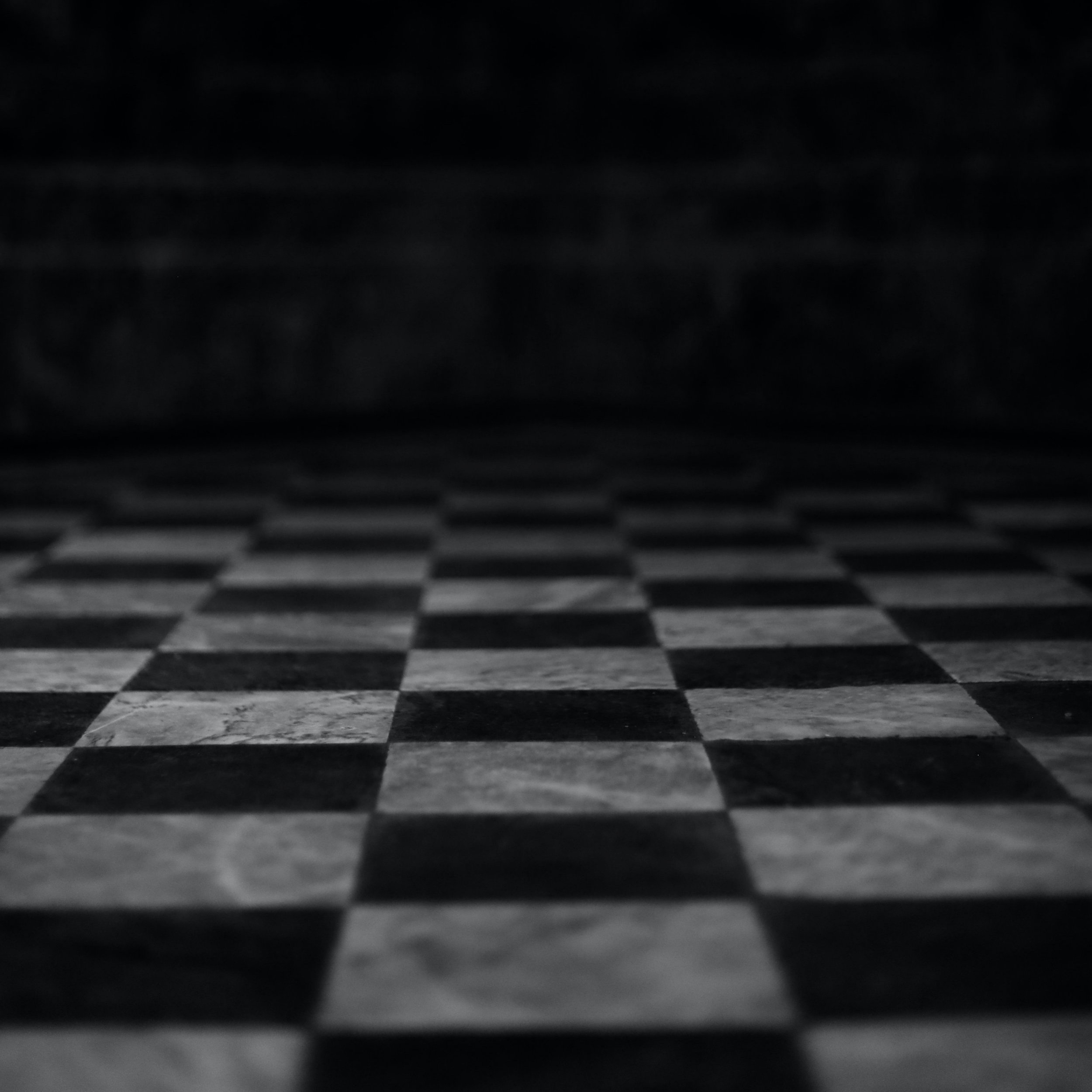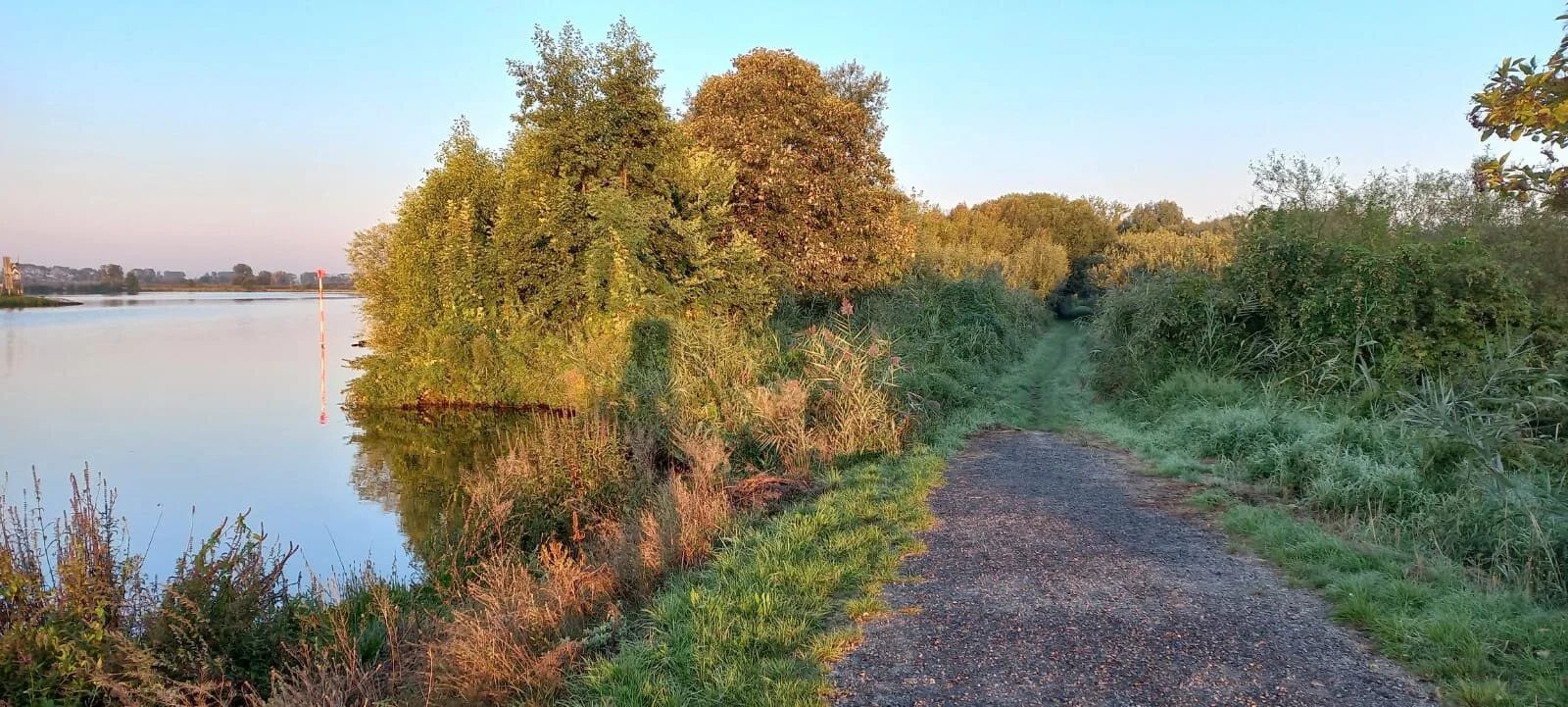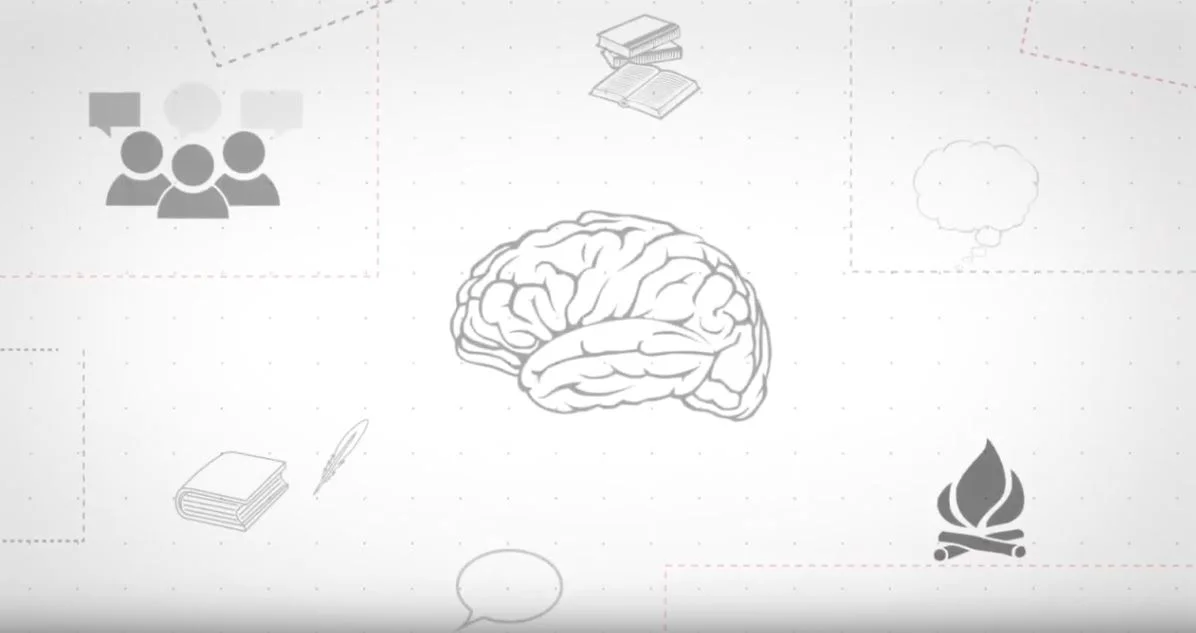“The great turning is the story we hear from those who see the great unraveling and do not want it to have the last word. […] The central plot is about joining together to act for the sake of life on Earth.”
Joanna Macy
Intro
What is the story of the future we want to live into? This was one of the fundamental questions that guided our second conference in Hamburg in 2018. We all know that the future is hard to predict – and that there is power in the stories we tell about it. Working with futures in the last two years has teached me one thing: even if there seems to be a future mapped out in front of us, it is the stories we tell and the metaphors that also impact how it might unfold. This is not an exercise in magic thinking, but in the power of story.
There is hardly anything that challenges us as much as climate change: the impact of the human way of living clearly has an impact. The slow feedback loops of spaceship earth are closing and the impact can hardly be overestimated: something big is coming and we are challenged to collaborate across the planet to somehow brace for that impact – or prepare for the aftermath.
And of course, this story of the future is driven by fear: the fear of the annihilation of entire ecosystems, of toxic oceans and the depletion of our live stock. Fear can be a tremendous catalyst for change. But it can also freeze us against the wall. Unable to find our speech, unable to do the small wise steps that would move us forward.
So what if we would ask what we could win in the long struggle to recalibrate our ways of living to something that is within the planetary boundaries of survival? How can we imagine a future in which the conditions for life on this planet are regenerated? What would be the treasures that we would find at the end of this collective hero´s journey?
I had the opportunity to host two sessions on this topic in the last months. The first one at BEYOND STORYTELLING 2019 – StoryCamp Lingenau. The second one during the House of Beautiful Business. Here I try to capture the treasures that we found.
StoryCamp Lingenau: Climate Change – What´s the Treasure?
The idea for asking about the treasure was born during the StoryCamp in Lingenau. It was early summer but the temperatures easily crossed 30 degrees. It was my first night there and we just set up the Camp in and around the village. It was so hot, I couldn´t sleep. Amazonia was burning, and the air in Austria felt like that too. It was to hot to sleep.
Fast forward a day. StoryCamp, second day. A blank wall fills with topics that people want to explore. I think of the hero´s journey and the treasure. The question was born. In the morning session I find myself sitting in the library with 5 companions, ready to explore the question.
Part 1: Getting started
Talking about climate change can lead to abstract discussions. As an introduction, the participants were therefore asked to share a moment when climate change becomes "tangible" for them:
A participant from Slovenia spoke about air conditioning systems. She could not remember that in her childhood there was air conditioning in summer - neither in her house nor in holiday flats. Today they are part of the standard equipment. And they are also urgently needed in summer.
A participant from Switzerland reported how a spring behind her house carries less and less water every year. Where water used to flow all year round some time ago, today it is limited to winter, spring and times when it rains heavily.
One participant spoke of a book about "collapsology". From your decision to buy a book that talks about the way of dealing with the end of the world as we know it. And she buys the book because she is afraid for the future of her children.
In reflecting on these moments, our discussion revolved around two points:
The difficult emotions associated with the climate crisis: many of the participants experienced or observed helplessness, anger, frustration, hopelessness. It was reported of the feeling to be "slain" by news (e.g. about the forest fires in the Amazon) and to fall into a "rigidity".
What is missing is a story that can bundle people's efforts, skills and abilities for a common, different future. Industrial modernity was carried by a narrative of growth and exploitation/control of nature. But what story replaces this narrative?
Part 2: What is the treasure? From value creation to creation of well-being
What's there to win? What treasure could wait for mankind if it succeeds in overcoming the climate crisis? With these questions we started into an open development of ideas.
Connectedness: Many of the ideas can be summarized under the concept of connectedness: a new connectedness not only with our fellow human beings, but with the planet as a whole, with the planet as a living system. Instead of isolation in filter bubbles and alienation in abstract value chains, there is a sense of community. A community that understands that all parts are interconnected and that the consequences of human actions are a central factor for the living conditions on this planet.
The creation of well being instead of value creation: The treasure is also a redefinition of what is considered valuable. It is about a form of life and economic activity in which values are not "extracted" from the soil, people or nature, but value creation is understood as a contribution to improving the basis of life for all life.
Technology: In the course of dealing with the climate crisis, there will be technological breakthroughs that will enable this change from "extracting" to "regenerative" forms of economic activity.
Part 3: Reflection
In the aftermath of this collection of ideas, the conversation was reflected upon from different perspectives.
The main topics:
Conflicts and polarities: The climate crisis is the result of a certain form of economic activity and consumption. Over the past two centuries, this form of economic activity has made possible incredible prosperity in some parts of the world. At the same time, the way we deal with the climate crisis shows the rigidity of the system and the fear of losing the privileges that come with being part of it. A change in the economy is partly perceived as a threat to these privileges.
When our descendants look back at our time with satisfaction at some point, they will also tell a story of shame, forgiveness and reconciliation between generations.
This is especially true for the post-war generation, for example in Germany: what carried this generation after the Second World War was the history of reconstruction and the pursuit of a life of peace and prosperity. This history became reality, at least in West Germany. It is difficult to acknowledge that this history is also responsible, that our livelihood is in danger: it calls life plans into question. When our descendants look back at our time with satisfaction at some point, they will also tell a story of shame, forgiveness and reconciliation between generations.
Story and metaphors: At the beginning of the session, the analogy of a monster-in-house story was used for the climate crisis. Climate change - like the monster in ... - must be fought. But what if this story were a "man on the moon" story? What if it were the story of the "growing up" of the human species? What if the climate crisis were the frog king of mankind?
Earth has been our dance floor long enough, now it's up to us to learn to be a good dance partner.
This awareness of the stories of the climate crisis is necessary. This is because the metaphors and stories we tell influence what we think is possible or impossible. New stories enable new perspectives and new ideas. At the end of the session, there was a metaphor that summarized a lot of what was discussed: The earth was long enough our dance floor, now it is up to us to learn to be a good dance partner.
Climate Change – What´s the treasure? @ the House of Beautiful Business
The House of Beautiful Business is dedicated to the question of how the economy can be rethought in the age of machines. What place do people have when added value is increasingly automated and digitalized? In addition to lectures, workshops and an accompanying programme, rooms were also offered for spontaneous sessions. A good framework for exploring the question "What could be the end result of a successful handling of the climate crisis? The session was structured similarly to the StoryCamp Lingenau:
Part 1: Getting started
Here, too, we asked the participants about moments when climate change would become "tangible" for them. It became clear that climate change and the associated weather events and ecological consequences are only part of a more complex challenge: environmental pollution and the problematic use of planetary resources. The moments I can still see most clearly:
A participant from China reports about a conversation with his son. He asks (the family previously lived in Switzerland): "Why is the sky no longer blue? Beijing has a massive problem with smog.
A participant from Sweden reported about his concern about global cynicism: instead of asking the basic questions, there is a cynical "Keep it up! It's too late anyway"
A participant from Germany tells how difficult it is to choose the right means of transport. When planning trips, distance plays an increasingly important role: he wants to avoid flying.
Part 2: The moment in 2050
Afterwards the participants were asked to imagine the moment in the year 2050. In the meantime, humanity has managed to overcome the climate crisis and find solutions to the ecological crisis. The moment was captured in small texts and pictures.
"In the year 2050 I am sitting with my husband in a house for the elderly. It is high in the mountains, surrounded by beautiful nature - the sun is shining and it is peaceful - and I think "Yes - we made it". We were able to get this terrible time behind us in the 20s. To leave behind the hatred, the divisions and the cynicism and to come together: as a family of all people, driven by the realization that we die or live together. I feel hope for my son and my grandson."
In small groups, the participants then imagined their future moments. The listeners should search the stories and pictures for possible "treasures" and then summarize them by asking two questions:
How did life develop for the better after the climate crisis was overcome?
What has changed in our relationship to ourselves, nature, our communities and technology?
Part 3: Finding the treasures
Solidarity and community: Overcoming the climate crisis has led to more solidarity between people. We are in better contact with each other - on a global and local level. This solidarity is both the cause and the result of the successful handling of the climate crisis.
Economy and consumption: The economy has been transformed. Instead of gross domestic product, other criteria for measuring economic performance were introduced. New technologies have led to new economic impulses. People are prepared to consume less matter.
Education and personal development: The foundations of a new way of life and working are at the heart of education from childhood. Spiritual and personal development is an integral part of what is taught and learned.
Part 4: Reflection
In the reflection of the session, the "how" of change was once again addressed. All participants agreed that it will be difficult to change old habits, structures and world views. And that this change must take place on all levels: on a personal level, in the local "communities" and on a structural level: in laws and the economic system.
The sentence I remember most clearly:
To make it happen, we have to be warriors not worriers.
What if we don´t make it?
I recent article by Jonathan Franzen sparked quite a bit of dissarray. In this piece, he argues that humanity should brace for the full impact of the climate crisis. That the efforts to stop and reverse global warming are indeed pointless. That we should invest in strengthening the institutions that will guide a good way of living after the damage is done.
One can critize this position for many reasons. Yet, thinking through that scenario might provide additional insights. One of the final sessions of the House of Beautiful Business addressed exactly this question: A new social contract – how can we live together if we fail to solve the climate crisis?
Facilitating an unstructured session is not an easy thing, yet the participants permitted me to change the question a bit. After all, beauty was a central theme to the conference. The question for the final harvest was: How can we live together in beauty if we can´t solve the climate crisis?
These are a few of the results of the session:
We have make more of what really matters. Or to put it into the words of a participant: stop filling the emptiness with pointless shit.
Platforms for sharing and pooliing of resources have to grow. Grass-roots and community building initiatives have to carry this effort. Both off- and online local networks have to be strengthened and governments have to build frameworks for this.
The educational system has to include the crafts of living well together (empathy, compassion, collaboration) and strengthen the ability for basic live stock management (farming, building, repairing).
A mindset shift will emerge, letting us become aware of our deep interdependency with everything on this planet. A transnational identity will emerge while at the same time a radical relocalization has to take place, rooting communities in their locale.
Outro
“We think we tell stories, but stories often tell us, tell us to love or hate, to see or to be blind. Often, too often, stories saddle us, ride us, whip us onward, tell us what to do, and we do it without questioning.
The task of learning to be free requires learning to hear them, to question them, to pause and hear silence, to name them, and then become a story-teller.”
Rebecca Solnit
Looking back at these three sessions I feel hope. Yes, disorder has affected the land (to praphrase the wonderful talk by George Monbiot), but there are stories emerging that could carry our efforts to reset the way we live. To unfreeze us and to make us find a way to speak about and act upon the challenges ahead of us.
Yet, it is tempting to try to maximize our privileges in the current system. We can step into a story in which it is too late for everything. A story, in which we party while the world is burning. Or we can tell ourselves the story of flying to mars and reboot society there. Different planet, same story.
The collective imagination of humanity is a source of creativity – for better or for worse. We are indeed able to story the future in a new way and to find the treasures. We can choose which story we step into, the choice is ours.

